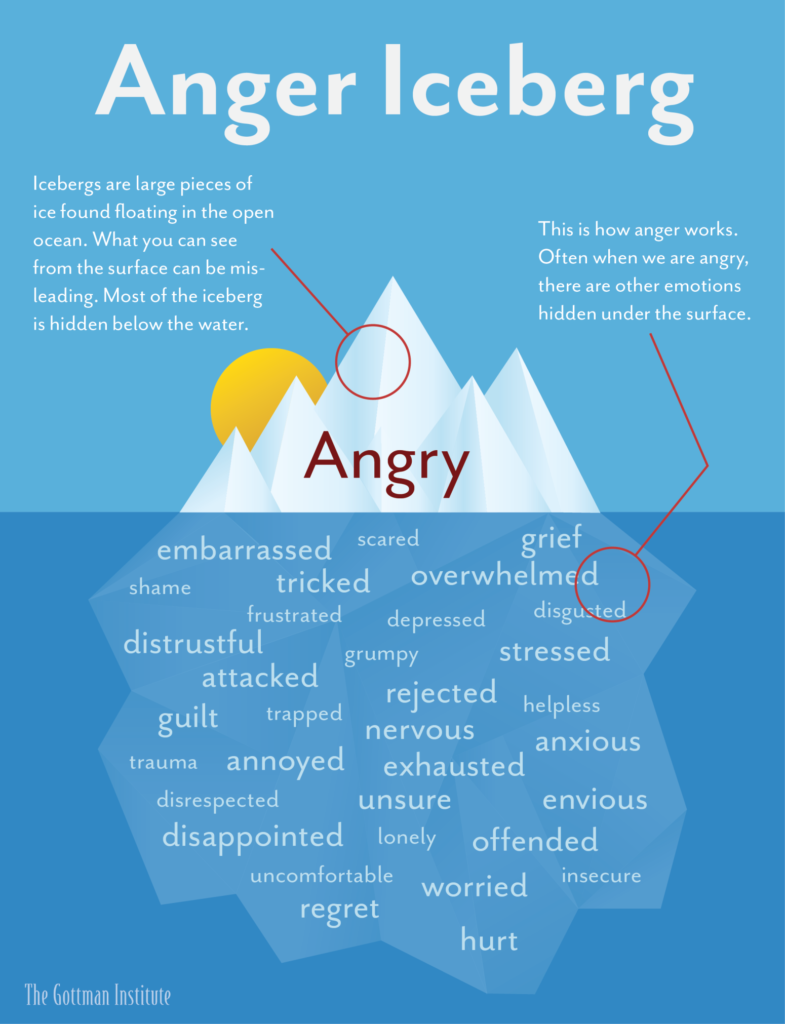By: Keely Kelley, LPC-intern

Have you ever been in a situation where you were angry/upset/frustrated? I am sure 99% of you reading this answered “yes”. Anger management is an issue that counselors help with often. When a person becomes angry, the blood rushes to their hands to fight. Adrenaline is surged throughout the body to give the person more energy to move faster. These different physiological responses and many other responses are the brain’s way to protect us. What our brain doesn’t know is that anger is usually a secondary emotion. Let me explain by giving an example.
Dave1, a husband and father to three children, comes home from work. His wife Brenda1, who is a homemaker, is standing at the stove cooking dinner. Upon entering the house, Dave sees that there are toys strewn about, clothes in the floor, and shoes cluttered at the front door. As soon as Brenda sees Dave she is snapping orders at him and has a rude tone towards Dave. He can see she is angry, but doesn’t understand why….he just got home after all. Brenda is not feeling angry, she is feeling overwhelmed.
Anger can be thought of as an iceberg.

At the surface or what we see may looks like anger, but under the surface and what we don’t see is the actual problem. What the person may be feeling is disappointment, nervous, insecure, grief, helpless, rejected…. The list could go on. Emotional pain or distress can present itself as anger.
So how can we control our anger?
Become Aware of Your Anger Early
Learn the warning signs for when you are becoming angry so you can address it quickly. Common anger signs can be feeling hot, raising your voice, balling your fist, shaking, or arguing.
Take a Timeout
Temporarily leave the situation that is making you angry. If there is another person involved or in the room, explain that you need a few minutes to calm down.
Deep Breathing
Take a minute to just breathe. Use the 4x4x4 method of breathing in for 4 seconds, holding your breath for 4 seconds, and exhaling for four seconds. Counting the seconds helps take your mind off the situation as well.
Exercise
Exercise can be an emotional release. The chemicals that are released during exercise can create a sense of relaxation and happiness.
Express your Anger
Once you are in a calm state, express your frustration. Addressing the issue and expressing yourself helps avoid the situation in the future. Be direct, but not confrontational.
Think of the Consequence
What will be the outcome of your anger-fueled action? Will arguing convince the other person that you are right? Will you feel better after the fight?
Visualization
Imagine a relaxing place or state you have experienced. What do you see, smell, hear, feel taste? Maybe on the beach with sand between your toes and waves crashing in the distance. Spend a few minutes imagining every detail of the relaxing scene2.
If anger is an issue that you are experiencing more than you would like, we would love to help. Call our office to set up an appointment with one of our counselors. We can be reached at (918) 423-0220, our HIPPA compliant text line at (918) 319-2935, or email at info@oklahomacc.com.
1 Names in this example are fictional.
2 Retrieved from therapistaid.com

